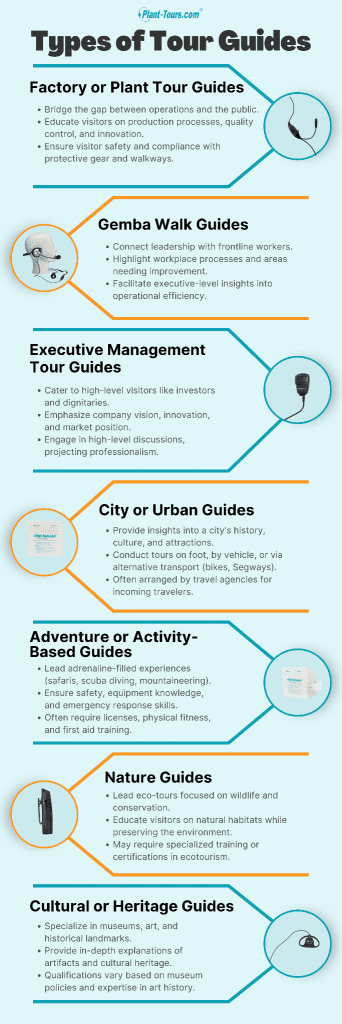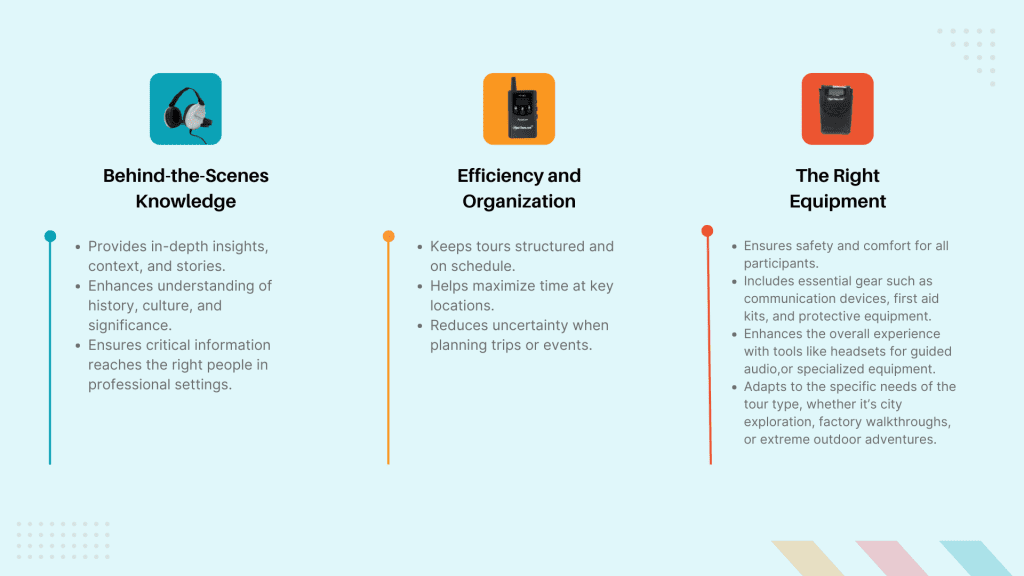“Thomas Cook should be numbered among the secular saints. He took travel from the privileged and gave it to the people.”
Robert Runcie
English Baptist missionary-turned-businessman Thomas Cook is sometimes called “the father of modern tourism.” He and his travel company are largely credited with introducing the world to the concept of guided tours back in the 18th century. Cook often gets the credit; however, around the same time, travelers in Japan could pay a guide to show them around its cultural capital of Kyoto. In the 17th-century Vatican, guides known as cicerones would lead tours around historical sites throughout the Mediterranean. In other words, being a tour guide has been a global profession for centuries, and its exact origins remain unclear.
What Is a Tour Guide and Their Role?

The tourism industry has come a long way over the centuries. In 2021, travel and tourism contributed 10.3% to the global GDP (almost $9 trillion). Japan, Spain, and the U.S. were the top three leaders in the Travel and Development Tourist Index (TTDI) that year, and there are currently close to 47,000 tour guides employed in the U.S. alone.
The job of a tour guide today is as diverse as there are points of interest around the world. As such, it can be difficult to pin down exactly what the job entails. If I may borrow from a cliche, the Merriam-Webster dictionary defines a tour guide simply as “a person who takes people on trips through an area and explains the interesting details about it.” But that’s just the tip of the iceberg.
Skills Required for Tour Guides
A good tour guide needs to have a certain set of skills to do the job well. Some of those include:
- Interpersonal skills — In this job, you’ll want to be a people person. Being able to carry a conversation, direct groups of people with authority, and maintain a cheerful disposition are all important to your success.
- Specialized knowledge — Whether you’re leading groups of school children through an art museum or giving detailed tours of a factory, you need to know what you’re talking about. Expertise is one of the most important characteristics of a tour guide.
- Time management — Tour guides often perfect a speech that lasts for a specific amount of time, covering all the aspects of the tour and ensuring everything stays on schedule.
- Safety training — You may need specialized safety training depending on the location of your tours. The ability to perform CPR or administer first aid may be necessary if someone in your group has a medical emergency or gets hurt.
- Problem-solving skills — From lost belongings to medical emergencies, tour guides need to be able to handle unexpected problems efficiently and effectively. They need to be resourceful and able to find solutions quickly.
Do Tour Guides Need to Speak Multiple Languages?
Tour guides work with people from all over the world, and often encounter many different languages over the course of a workday. You might wonder if that means tour guides need to speak multiple languages to be successful. Thanks to modern technology, that’s not necessary. Devices like communication headsets can make it easy for a tour guide to connect with an interpreter so that information can be shared with everyone in real time. You can weigh the benefits of simultaneous vs. consecutive interpretation to help you decide the best way to provide multi-language options to your guests.
Types of Tour Guides

While most people probably associate tour guides with vacation destinations, museums, or historical sites, there are endless possibilities for folks who want to get into the field. You can certainly go to exotic locations to guide tourists through their travels, but you can also find tour guides right in your hometown if you know where to look.
Factory or Plant Tour Guides
Factory and plant tour guides bridge the gap between a company’s operations and the public, offering a glimpse into the inner workings of manufacturing and production. Their role extends beyond simply leading visitors through a facility; they are brand ambassadors, educators, and safety advocates. Tour guides must possess a strong understanding of the production process, explaining complex machinery and technical jargon in an accessible way. They highlight key stages of manufacturing, emphasizing quality control, efficiency, and innovation. Safety is paramount, and guides are responsible for ensuring visitor compliance with safety protocols, including wearing appropriate personal protective equipment and adhering to designated walkways.
GEMBA Walk Guides
Similar to plant tours in that they involve touring a workplace, Gemba walks are a specialized type of tour that aims to connect a facility’s leadership with its workers on the ground. The term “Gemba” comes from the Japanese for “the actual place,” which is translated in this context to describe the place where work is being done.
A tour guide’s job on a Gemba walk is to take participants through the workplace, describing the functions of each department or area, and help highlight any issues that need correcting at the executive level.
Executive Management Tour Guides
An executive management tour guide caters to high-level visitors, often clients, investors, or dignitaries. Their role is to showcase the company’s capabilities, vision, and success in a polished and professional manner. They possess deep knowledge of the company’s strategy, products, and market position, tailoring the tour to the specific interests of the executive guests.
The focus is less on technical details and more on the big picture, emphasizing innovation, growth, and return on investment. This guide is a confident and articulate communicator, capable of engaging in high-level discussions and building rapport with influential individuals. They are essentially a representative of the company’s leadership, projecting an image of competence and excellence.
City or Urban Guides
City tour guides are a great way to get to know a city in a short amount of time. They’re common in most major cities of the world. City guides can show travelers an array of different things — from bars and restaurants to museums and shops to historical and cultural landmarks. So they tend to be locals who have a thorough knowledge of many different aspects of the city.
A travel agency will often arrange for city guides to meet travelers coming directly off of motor coaches, cruise ships, shuttle buses, and so on — and proceed to introduce them to the city. These excursions are often walking tours, but they can also be conducted by car, shuttle, boat, or bus. It all depends on the size and layout of the town. Biking and the use of scooters and segways are also an increasing trend for city tours these days.
Adventure or Activity-Based Guides
Adventure guides arguably have the most fun when it comes to the tourism industry. For example, they can be driver guides (aka a driver and tour guide in one) taking you on safari in Africa or mountaineering guides helping you climb Mt. Fuji. Adventure guides can take you canoeing along the Amazon, scuba diving in Thailand, trekking through the Sahara, or snowmobiling and dog sledding in Antarctica. The possibilities are endless.
But while every day can be a new adrenaline rush, an adventure guide is also responsible for the safety and well-being of all the tour members in their group. So in addition to knowing all the relevant information about their tour and terrain, adventure guides should also have a certain level of experience and skills when it comes to their particular sport or activity.
Depending on the activity, knowing how to properly maintain and use all the necessary equipment is often a requirement of the job. Moreover, impeccable communication skills, physical fitness, first aid training, and the ability to quickly and adequately respond to emergencies are all usually a must too. That’s why you’re more likely to find licensed guides in these particular fields.
Nature Guide
Similar to park guides, nature guides take tour groups to natural attractions where wildlife and scenic locations are the main focal points. Nature tourism is particularly popular with the millennial market these days, and it is therefore closely associated with ecotourism. The International Ecotourism Society (TIES) defines ecotourism as “responsible travel to natural areas that conserves the environment, sustains the well-being of the local people and involves interpretation and education.”
Nature guides also get to spend most of their day in the great outdoors, familiarizing their clients with beautiful exotic locations and their inhabitants. And they also help to preserve the environment. So, depending on the company, the tour manager, the specific location, and the local laws, being a nature guide may require a certain level of qualification and training too.
Cultural or Heritage Guides
Museum guides familiarize tour groups with the artistic and cultural heritage of a city. As opposed to a regular visit, a museum tour director and/or guide can ensure a more in-depth understanding of a museum’s art, artifacts, and background. And there are plenty of these dedicated professionals around the globe too, especially in city capitals.
According to UNESCO, the overall number of museums has more than tripled in the last half-century, and there are roughly 95,000 museums worldwide today. These include some atypical ones — such as Beijing’s Museum of Tap Water and the British Lawnmower Museum. Or the Salt and Pepper Shaker Museum in Tennessee and Boston’s Museum of Bad Art (aka MOBA).
So while a general knowledge of art history and local culture helps, the qualifications to be a museum guide largely depend on the museum itself.
Factors to Consider When Choosing a Tour Guide
As you consider your options for a tour guide, I recommend checking into a few things before making your decision.
Knowledge and Expertise
Ensure the guide possesses in-depth knowledge of the subject matter, whether it’s history, culture, nature, or a specific location. Look for guides with relevant certifications, experience, or specialized training.
Communication and Interpersonal Skills
The guide should be an engaging and articulate communicator, able to present information clearly and enthusiastically. They should also be personable, approachable, and able to create a positive and inclusive experience for the group.
Reviews and Recommendations
Check online reviews, testimonials, or ask for recommendations from previous tour participants. This can provide valuable insights into the guide’s performance, professionalism, and ability to deliver a quality tour experience.
Benefits of Having the Right Guide

The right tour guide can take an experience from good to great. I especially want to highlight these benefits:
Behind-the-Scenes Knowledge
A knowledgeable guide brings a destination to life, providing context, insights, and stories that you wouldn’t discover on your own. They can deepen your understanding of the history, culture, and significance of the places you visit, making the experience more meaningful and memorable. In a professional environment, the right tour guide can make sure every important piece of information is relayed to the people who need it so that real and effective change can happen for the greater good.
Efficiency and Organization
When you want to hit all the important spots without spending too much time in any one area, a tour guide comes in handy for keeping you on track. The structure a tour guide provides also helps you plan the rest of your trip or event with fewer variables.
The Right Equipment
Having the right equipment is just as crucial as having the right guide. A well-equipped guide ensures both safety and an enhanced experience for participants. From communication devices like headsets that allow guests to hear clearly in noisy environments to essential safety gear such as first aid kits and protective equipment, the right tools make all the difference.
Conclusion
As a tour guide, you act as a sort of cultural ambassador to visitors and travelers. So good communication skills and an interest in culture and history are essential starting points for any of the above jobs.
The advantages of being a professional tour guide are countless. You get to learn more and more about your own area, culture, and history. You constantly meet people from all walks of life and backgrounds.
You have the chance to learn new languages and cultures. You can travel the world and take part in exciting and extraordinary activities, both indoors and out. And — most importantly — you provide people with unforgettable experiences and memories that can last a lifetime.If you consider pursuing the tour guiding career path, I recommend learning about the advantages of using a tour guide system to provide the best possible tour experience.








